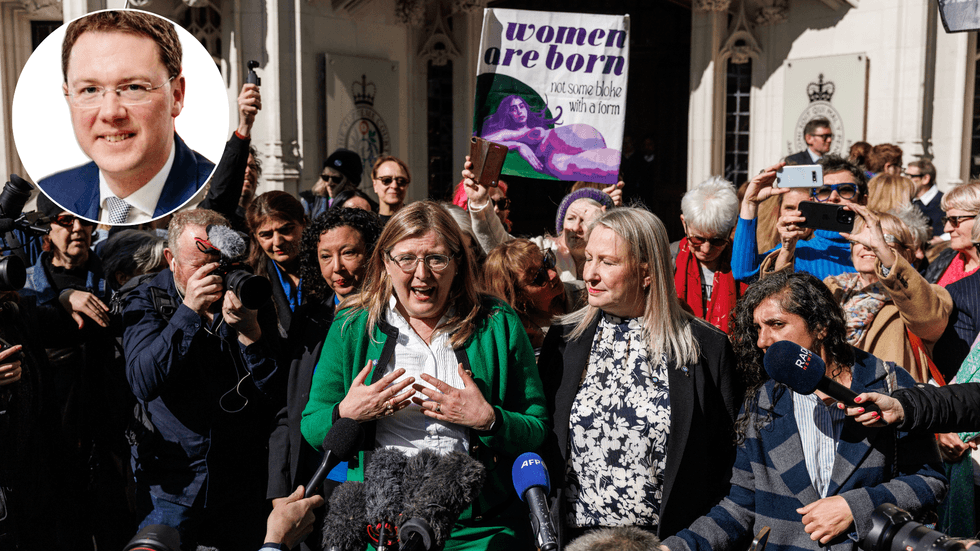Carole Malone on Supreme Court landmark ruling
GB News
OPINION: After years of ideological capture, the courts restore sanity to the debate on sex and gender in law, says Robert Courts KC
Don't Miss
Most Read
Latest
At long last, a victory for common sense.
In a landmark decision, the UK Supreme Court confirmed what most people instinctively know, but many in public life have been too afraid to say: the word “woman” means adult human female. Not an identity. Just the reality that, in their words, the “concept of sex is binary” under the Equality Act 2010.
This wasn’t a ruling on identity politics. It was a ruling on law. And it reasserts something that has been dangerously eroded in recent years: legal clarity. The case, brought by the campaign group For Women Scotland, centred on whether the Scottish Government could lawfully expand the definition of “woman” in legislation designed to ensure female representation on public boards. At its heart was a simple but fundamental issue: whether “sex” under the Equality Act 2010 meant biological sex - or self-declared gender identity.
Until this ruling, several public bodies believed the correct answer was the second one. That is now over. The UK’s highest court has ruled decisively that under the Equality Act 2010, “woman” refers to biological sex.
The Court was clear: terms like man and woman carry their ordinary, natural meaning in law. That might sound obvious. But in 2025’s increasingly fevered public discourse, it’s a breakthrough.

The supreme court has finally given organisations permission to act with courage - Robert Courts KC
GB News/Getty Images
Not just for policy clarity or public service provision, but for every woman who has watched her rights diluted by stealth. Women's changing rooms, hospital wards, prisons, and competitive sports have all been compromised by a politically imposed ambiguity about what the word “woman” actually means.
The judgment provides a course correction. It doesn’t roll back trans rights. It most certainly is not a charter for people to be treated cruelly, or for bullying or hurtful behaviour. Harassment is illegal – as it has always been. But this judgement does restore women’s rights - and reaffirms that those rights are based on biological sex, not self-identification. Public authorities - from the NHS to prison governors - must now apply a definition rooted in biology when delivering single-sex services. That shouldn’t be controversial. It should be seen as essential.
It also underscores the vital importance of clear, lawful guidance from government departments. Government guidance must now reflect this ruling. For years, muddled or activist-led guidance has led public bodies astray. That must end. Civil servants and ministers now have a duty to ensure policy aligns with the law as clearly, powerfully expressed by the Supreme Court.
For too long, institutions have been paralysed by fear of offending a vocal minority, and individuals terrified of “cancellation” – just look at the treatment of JK Rowling. This decision gives organisations permission to act with clarity and courage. Single-sex spaces can now be protected without caveat. Crime statistics can reflect biological reality.

JK Rowling has faced severe treatment from trans activists.
Getty Images
It is also a vindication for those who’ve stood firm against ideological capture, especially the women who’ve spoken up, often at great personal cost. This is a victory not for partisans, but for those who insisted that law must remain grounded in common sense.
Some in government and the civil service won’t welcome this clarity. For years, Whitehall departments and public agencies have relied on vague guidance and policy drift to avoid making tough calls. That approach no longer washes. The courts have now forced Parliament and public authorities alike to face the consequences of ambiguity.
Most importantly, this ruling draws a line under a damaging period of drift, where ambiguity causes real harm to real people. That ends now. Legal definitions cannot be rewritten by activist campaigns or internal memos. The judiciary have come in for a lot of criticism, recently – and some of it is justified – but today they have performed with the legal and intellectual clarity and common sense that has always been the hallmark of English law.
It was a good day for women. A good day for the law.












